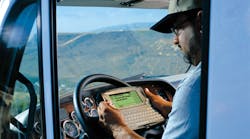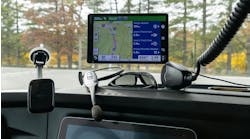The use of GPS-based mobile resource management (MRM) systems has expanded over 50% since 2009, with local fleet operations leading that growth over the last two years, according to a new report. Declining prices for in-vehicle hardware, better cellular data coverage and “growing awareness among local fleet operators of the high return on investment” are driving the move to MRMs among service, delivery, municipal and transit fleets, according to the 2012-13 U.S. Mobile Resource Management Systems Market Study just released by C.J. Driscoll and Assocs.
Among heavy truck fleets, truckload carriers are “a mature market” for MRM systems, with 40% largely using in-cab units. LTL carriers, which the report says operate approximately 200,000 trucks, have a 25% to 30% penetration rate with MRM solutions that include smartphone and tablet applications as well as in-vehicle units.
In the local fleet segment, the report indentified a growing move away from client-server based MRM systems to hosted systems run by suppliers. Those hosted systems range from low-cost basic tracking services to fully-featured enterprise management systems that include messaging, navigation and dispatching features. In addition, the report identified a growing trend among local fleets using OSx and Android devices to monitor fleet activity.
Integration with OBD-II data networks on light commercial vehicles is becoming common in this segment, providing fleet managers with ways to monitor driver and vehicle performance, maintenance and other operating information that can impact fuel consumption and safety, according to the Driscoll report. Driver scorecards and driver-performance statistics tied to GPS location data are also gaining popularity among local fleets.
In-cab installed MRM units among long-haul fleets have grown from 570,000 units in 2009 to an estimated 700,000 units today, according to the report. The lion’s share --660,000 -- are provided by Qualcomm, PeopleNet and XRS (formerly Xata), with the other 40,000 coming as installed equipment from truck manufacturers.
Despite the widespread adoption of MRM by many long-haul fleets, the new CSA safety measurement system put in place in late 2010 is encouraging non-adopters in that segment to move to electronic onboard recorders (EOBRs) to help them manage their safety ratings, the report pointed out. Expected rules from the Federal Motor Carrier Safety Administration (FMCSA) mandating EOBR use “would have a very significant impact on the growth of the EOBR/MRM market,” it pointed out.
The growth of MRM systems for monitoring trailers and containers was slowed considerably by the recession, according to the report. After more than doubling from 260,000 to 575,000 units between 2005 and 2009, the installed base declined in 2010. However, the report said that growth in trailer MRM use returned to “moderate levels” in 2010 and 2011, with leading suppliers reporting that “2011 was a good year.”



